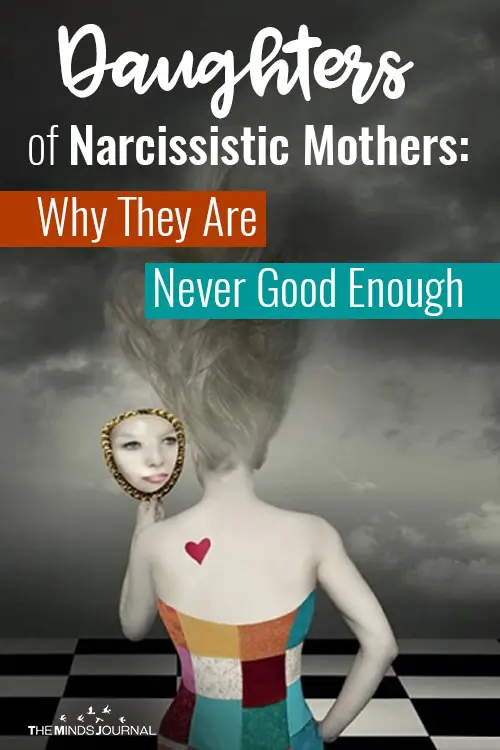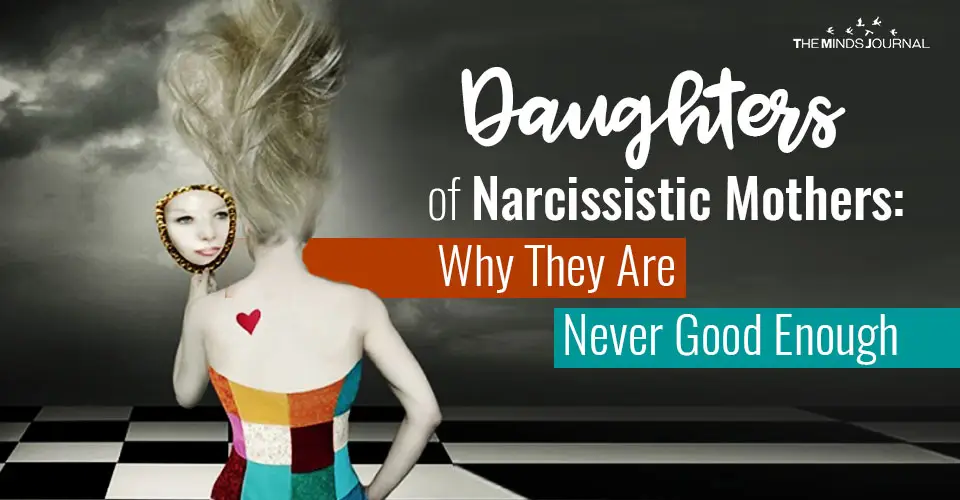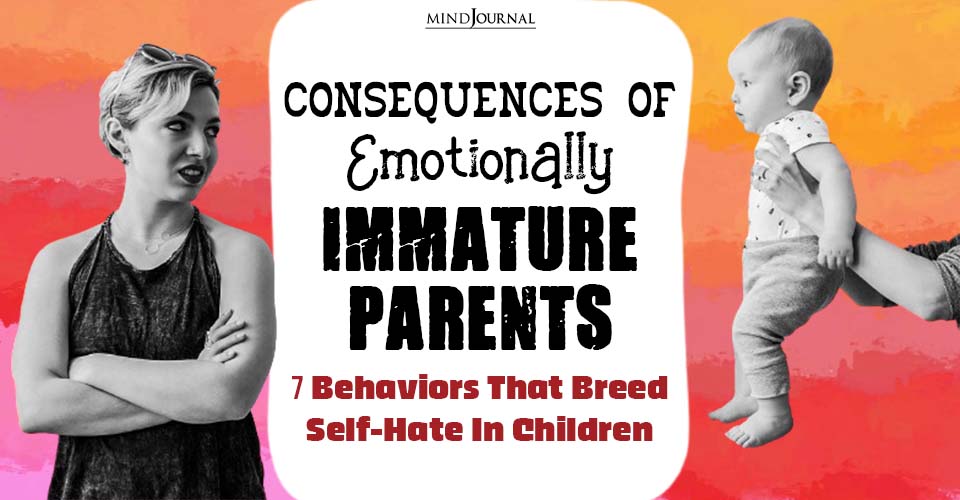Daughters of narcissist mothers try hard to gain their mother’s love and approval. But, are never able to please her. The things narcissistic mothers say, make daughters feel they are not good enough, no matter what they do. Read on to know why.
Not good enough. That was what I thought about myself. I was never good enough.
When I was growing up I had this chorus inside my head. Particularly, from my teenage years into adulthood.
It was the background noise to everything I ever did or said.
Voices that drowned all other thoughts out and would never give me a break.
You’re not good enough
That was the general gist of what they’d say.
I never felt good enough.

Imposter Syndrome
When I started to have lucky breaks in my television career I kept wondering when I was going to get found out.
Related: What is Imposter Syndrome?
That I didn’t know what I was doing. I was more stupid than I was making myself out to be. I was an impostor who didn’t deserve to be there.
I went on to have success three times over.
As a TV actress. A TV reporter and Foreign Correspondent. Then, as a TV documentary producer.
Throughout all these careers, I felt a failure.
I was not feeling good enough. I still have moments, despite all I have achieved, where I feel that now.
Will I ever be good enough?
Why is it that some of us have this hole inside? An emptiness. A feeling of not belonging?
Where does this come from? This emotional loneliness?
The fear of not being good enough? We’re unworthy, unlovable?
Do you know what I mean? Are you never good enough?
It comes from our childhood. When our parents neglected our emotional needs. (They might have looked after you well in all other ways, just not able to cope with your emotions).
In my last post, I talked about emotionally immature parents. This time I am going to talk about narcissistic mothers. Specifically, narcissist mothers and their daughters.
This book by Karyl McBride, PhD inspired me:
Will I ever be good enough? Healing the daughters of narcissistic mothers
If this sounds like you, then I urge you to read it.
Here, I’ll summarise what it’s about:
As young girls, we look to our mothers as the ones to guide us into womanhood. To help us determine our worth.
But what if our mother is emotionally needy and self-absorbed and can’t give us unconditional love or emotional support?
She may look after our physical needs but abandon us emotionally.
Related: Why Your Narcissistic Mother Hates Your Body
Related video:
Narcissist mothers
Does your mother have narcissistic tendencies? Some questions to ask yourself are these:
1. When you try to discuss life issues with her, does she change the subject, or push it away?
2. Does she top your feelings with those of her own?
3. Does she act jealous of you?
4. Does she compete with you?
5. Does she lack empathy for your feelings?
6. Does she support only things that make her look good as a mother and ignore those that don’t?
7. Have you felt a lack of emotional closeness with her?
8. Does she know the real you?
9. Does she only do nice things for you when others are able to see, but neglect you at home?
10. When something happens (say, you get divorced) does she react how it will affect her? Not how it makes you feel?
11. Is she overly conscious of what others think?
12. Does she deny her own feelings?
13. Does she blame things on you, rather than be responsible for her own feelings or actions. Tell you ‘you’re too sensitive’, for example?
14. Does she hurt easily and carry a grudge for a long time without resolving the problem?
15. Do you feel like you’re a slave to your mother?
16. Do you feel responsible for her ailments, sickness or stress levels?
17. Did you take care of her physical needs as a child?
18. Is she critical of you?
19. Are you shamed by her?
20. Does the world revolve around her?
21. Does she want to control your choices?
22. Is she controlling and flip from being a victim to a martyr and back again?
23. Does everything have to be her way as the only way?
24. Have you ever wondered if she even likes you or loves you?
Daughters of narcissistic mothers
Daughters of narcissist mothers try hard to gain their mother’s love and approval. But, are never able to please her.
Read on to know why the life of daughters of narcissistic mothers can be emotionally harrowing.
It’s all about how something looks to her, not how it makes you feel.
She may be jealous of you.
She never supports healthy expressions of your self. Especially when they conflict with her own.
If you tell her you don’t like something she’s done, she’ll accuse you of being the ‘sensitive’ one.
She’s unable to empathise. She can’t deal with her own feelings, let alone yours.
She’ll be critical and judgemental.
Or, she may treat you like a friend, not a daughter. Crash through your boundaries, with you having no right to privacy.
Related: When A Mother Is Jealous of Her Daughter
The self-absorbed mother has vulnerable self-esteem.
She projects her self-hatred onto her daughter.
She may be doing this by being:
1. THE ENGULFING MOTHER
The one who dominates and controls. She makes all the decisions over what to wear, how to act, what to say, what to think.
A daughter can’t group up to find her own voice. She is an extension of her mother, not a separate being.
2. THE IGNORING MOTHER
She’ll look after your physical needs, clothe you and feed you. But, she won’t be there to provide guidance, emotional support or show you any empathy.
She’ll discount and deny your emotions. Dismissing them with words such as:
You’re too sensitive
She may flip between the two, one minute engulfing, the next controlling. Or, she may be engulfing to one sibling and ignore the other.
Your mother may be:
3. THE FLAMBOYANT EXTROVERT
The charismatic woman everyone loves. Who is fun, engaging, entertaining. But none of this with her children.
She might be:
4. ACCOMPLISHMENT-ORIENTED
What you achieve in life is paramount. Success is about what you do, not who you are.
If you are not successful according to her standards, it will embarrass her. She’ll be angry even.
She may offer you no support, as what you’re achieving takes away from her.
Until you have made it and are a hit in her eyes and she can relish in or show off about your success.
She may be:
5. PSYCHOSOMATIC
Using illnesses, aches or pains to gain attention and manipulate others.
If you take care of her, she’s the focus of your attention. If not, she’ll play the victim and guilt trip everyone in the family.
Often Dad will say:
Don’t upset your mother
Lest you bring on one of her migraines or some such ailment.
She could be:
6. ADDICTED
Children of alcoholic or drug-using mothers come second to her bottle or pills.
Related: Sons Of Narcissistic Mothers and The Damage They Suffer
She may be:
7. SECRETLY MEAN
Have a public face and a private self. She pretends to be loving in public, but she’s cruel at home.
Or,
8. EMOTIONALLY NEEDY
All narcissist mothers are, but some especially so.
They’re the ones whose children need to focus on them – to calm them, pander to them or solve Mum’s problems. All whilst denying their own needs and feelings.
She may affect siblings in different ways, albeit she’ll value all for what they do, not who they are.
ONE MAY BECOME THE OVERACHIEVER.
I’ll show you I’m worthy
That’s what she’ll tell herself and keep trying to do just that.
She’ll work hard and keep chasing more and more success to gain her mother’s love. She’s hoping to get the validation she needs to fill the emptiness she has inside.
But, this creates anxiety too, as she senses external validation can just as easily be taken away. She has to keep on accomplishing.
She’s busy, busy, busy, perhaps a workaholic. But, as she never feels good enough, she suffers from Imposter Syndrome.
ANOTHER SIBLING MAY BE THE POLAR OPPOSITE – THE UNDERACHIEVER.
The one who gives up. What’s the point? She’s never good enough, she’ll always be a ‘failure’ in Mum’s eyes.
This daughter will go on to self-sabotage. Numbing the pain with addictions – substance abuse, food addictions and the like. A self-destructive lifestyle.
Related: The Narcissistic Family Tree
Narcissistic families are disconnected emotionally. Mum is the centre of the family universe. Dad revolves around her.
He knows he has to take the supporting role. He accepts it as he’s learned it’s easier to take the path of least resistance.
He enables her. It’s an unspoken pact. He focusses on her. He tends to her needs. So, he neglects his daughters’ as well.
Everyone in the family comes second to Mum.
Daughters of narcissist mothers learn to repress their feelings and needs. In favour of hers.
Related: How To Build Your Belief In Yourself
They’re left grappling to work out how to gain her love and approval.
But she will never get it for who she is, only for how she makes mum feel.
When she can’t please her narcissist mother Mum, a child starts to feel there’s a problem within herself. She is unworthy, unlovable.
A daughter of a narcissist mother doesn’t learn boundaries. She can’t state what she needs in relationships.
She does learn how to hide pain and keep up the pretence and image that everything is okay.
All healthy relationships become skewed from this point on.
As adults, daughters of narcissist mothers become people pleasers.
You think that if you please, people, you’ll earn the love and respect you crave.
But, this learning to please others, at the expense of yourself will have a negative impact on future relationships.
So will those inner voices that replay Mum’s voice in your head.
Related: How I Survived A Narcissistic Mother and how you can do it too
Not good enough
I’m not good enough, you think.
They weaken your confidence and self-esteem.
When you look in the mirror you can’t see yourself. Your reflection is how your mother sees you. You take those internal negative messages with you into adulthood.
This is why daughters of narcissist mothers so often choose partners who can’t meet their emotional needs.
When the first hope of love is there, she will see the warning signs. But, she’ll ignore them. Override her gut feelings.
She’s attracted to what’s familiar to her. In a sense, there’s unfinished business. She’s unconsciously recreating her unhealthy mother-daughter dynamic. It feels right to her.
She feels the narcissistic partner needs her. To nurture and mother him and that makes her feel good.
Her parents abandoned her emotionally as a child and she knows how painful that feels. If she chooses a man she can rescue and control, she thinks: he’s dependent on her, he needs her. He won’t leave her.
He’s safe and predictable too. Like her mum, he can’t be emotionally intimate and vulnerable with her. Someone who can be, she’s not used to. It scares her.
She seeks love and approval with someone who can’t give it to her.
Related: How Adult Children of Narcissists Can Begin to Heal
A man like her mother will never fulfil her emotional needs either.
The day I realised my ex would never fulfil mine, was when I knew I had to heal my wounded inner child.
I had to accept maternal narcissistic traits are passed down the generations. My mother had a mother who was unable to fulfil her emotional needs as a child.
She can’t deal with her own emotions. She was never going to cope with mine.
I could see the good things she gave me and there are many. I love her dearly. But, I had to accept and grieve I would never have a healthy mother/daughter relationship with her. At least not on an emotional level.
I had to let go and fill the emptiness I felt inside myself.
As long as I saw myself as unworthy and unlovable, I would continue to seek men who treated me as such.
Once you recognise the source of emotional neglect as a child, you can process it and start to heal it.
First by allowing those feelings you’ve denied for so long to come to the surface. Once you’re in an environment that’s safe enough to do so.
I left my Ex and focussed on myself. I got support.
I won’t pretend it doesn’t hurt.
When you’ve to repress your feelings for most of your lifetime, letting them out is agony.
Anger, shame, fear – it will pour out. Trauma is difficult to heal from.
Little by little you fill that hole you have inside with self-love.
Learn that the image you have of yourself not being good enough is wrong. It’s a skewed perception.
But, you can change it.
Related: Whenever You Think You are Not Good Enough, Please Remember This
Ask yourself who am I? What are my true values, beliefs and goals? What are my strengths? What am I good at?
Surround yourself with only those who bring out the best in you. Who aligns with the best of who you are.

Related: 11 Signs You’re Surrounded By Negative People
I am good enough. You are good enough.
Keep saying this until you believe it:
I am good enough. I am worth it.
You are good enough.
If you say it often enough, it will come. So will a partner who treats you as worthy.
And if they don’t you won’t need them anyway. You’ll know you are enough. You always were.
Are you the daughter of a narcissistic mother? How has it affected you in adulthood? Let me know in the comments below.
Written by Vivian Mc Grath
Originally appeared on VivianMcGrath.com









Leave a Reply
You must be logged in to post a comment.